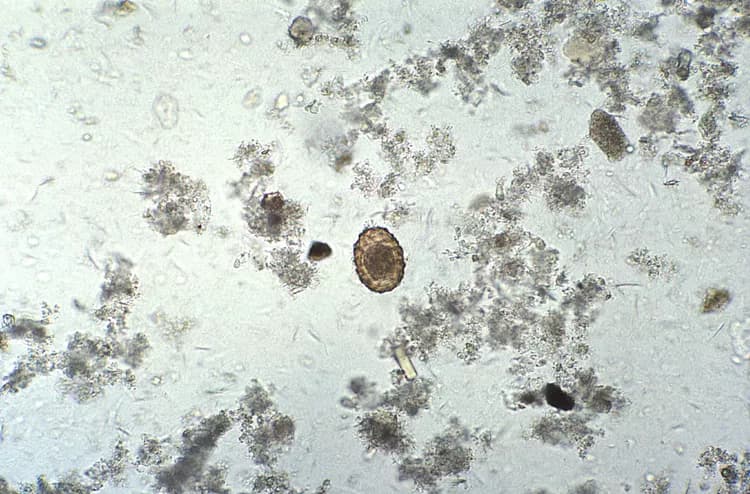What are the other Names for this Condition? (Also known as/Synonyms)
- Ascaris Lumbricoides Infection
What is Ascariasis? (Definition/Background Information)
- Ascariasis is a treatable disease caused by ingesting the eggs of a parasitic roundworm called Ascaris lumbricoides (also called Ascaris)
- This disease typically does not present with any severe symptoms, but parasites can invade the small intestine passing their eggs in the stool, in individuals with the infection
- These eggs can then deposit in the soil, where they mature and become infective, if someone defecates in the outdoors, or uses the stool as a fertilizer
- This parasite is transmitted through soil, so individuals can become infected if there is contaminated dirt on their hands or on their fresh produce (fruits and vegetables) that has not been completely washed-off before eating
- Ascariasis can affect the digestive system and cause abdominal pain, discomfort, and malnutrition. In some cases, individuals may even swallow or cough-up the worm
- The treatment of the infection is mostly using anti-parasitic medications. In many cases, no treatment may be necessary. The prognosis of Ascariasis is typically good with appropriate treatment
Who gets Ascariasis? (Age and Sex Distribution)
- Individuals of all ages, races, ethnic groups, and both genders are susceptible to Ascariasis
- Those who live in warm and humid climate areas with poor sanitation conditions and poor hygiene have a higher risk of developing infection
- Additionally, individuals living in developing countries, where human stool may be used as fertilizer, have an increased risk of infection
- While Ascariasis is the most common worm infection in humans (infecting more than 1 billion people worldwide), it is presently rare in the United States
What are the Risk Factors for Ascariasis? (Predisposing Factors)
The following are the risk factors for Ascariasis:
- Failing to wash hands after coming into contact with dirt
- Living in areas with warm climate
- Living in developing countries with poor sanitation (particularly, where human feces are being commonly used as a fertilizer)
- Pre-school and school-age children, who play in dirt
It is important to note that having a risk factor does not mean that one will get the condition. A risk factor increases one’s chances of getting a condition compared to an individual without the risk factors. Some risk factors are more important than others.
Also, not having a risk factor does not mean that an individual will not get the condition. It is always important to discuss the effect of risk factors with your healthcare provider.
What are the Causes of Ascariasis? (Etiology)
Ascariasis is caused when eggs of the parasitic Ascaris are ingested, after coming into contact with infected soil. The eggs are not infective, if contact with the soil does not take place.
- This is prevalent in countries with poor sanitation, where human stool is commonly used as a fertilizer
- Coming into contact with infected soil can make an individual prone to infection, especially if one does not wash their hands or wash fresh fruits and vegetables that came from soil using human feces as fertilizer
- In such cases, the parasitic eggs may get ingested with food. Once ingested, the eggs migrate to the small intestine, where they eventually hatch into larvae and travel to other parts of the body, including to the lungs
- If the larvae remain in the intestine or are re-swallowed after hatching, they can mature into worms. These worms reproduce and lay numerous eggs in the intestine, which are then expelled along-with the stool
- If the expelled eggs are in contact with the soil for at least 18 days, they become infective. In this manner, the process may be repeated
It takes approximately 2-3 months from the time of egg ingestion to the time that new eggs are laid and expelled in the stool. However, the Ascaris worms can live inside the body for up to 1-2 years.
What are the Signs and Symptoms of Ascariasis?
The signs and symptoms of Ascariasis may vary between the affected individuals. Individuals, who are infected, typically do not present with severe symptoms. However, some individuals may develop mild symptoms, including:
- Abdominal discomfort
- Persistent cough, resulting from the parasites moving through the body
- An individual may swallow the larvae/worms when a cough erupts, or cough-up larvae/worms
- Migration to the lungs results in symptoms similar to asthma (shortness of breath and wheezing)
- An uncommon form of pneumonia may present, called eosinophilic pneumonia (involving special types of white blood cells called eosinophils)
Severe infestation in the intestine can cause the following symptoms:
- Severe abdominal pain
- Fatigue
- Vomiting
- A partially or completely blocked intestine
- Passing worms in stool
- Weight loss and malnutrition
- Impaired growth in children
How is Ascariasis Diagnosed?
The diagnosis of Ascariasis is made by the following tests and exams:
- A thorough examination and assessment of symptoms (looking for areas of pain or tenderness in the abdomen, by pressing on the abdomen)
- Examination of worms that were coughed-up or passed in the stool
- Microscopic examination of a stood sample to look for the presence of parasitic eggs
- Testing blood for elevated levels of eosinophils (which are special types of white blood cells)
- Looking for visible masses of worms in the intestine or other organs via X-rays, ultrasounds, CT scans, and MRIs
Many clinical conditions may have similar signs and symptoms. Your healthcare provider may perform additional tests to rule out other clinical conditions to arrive at a definitive diagnosis.
What are the possible Complications of Ascariasis?
Mild forms of Ascariasis typically do not present any complications. However, heavy infestation of Ascaris lumbricoides can potentially lead to serious complications, including:
- Slow growth in children due to malnutrition; as the infection can lead to a loss of appetite and incomplete absorption of digested foods
- Intestinal blockage due to an aggregation of worms, leading to abdominal cramping and vomiting, possibly perforating the intestine or appendix (appendicitis)
- Blocked ducts of liver or pancreas, causing excruciating pain
How is Ascariasis Treated?
Treatment for Ascariasis is required in individuals who present with significant symptoms of the infection. In some cases, Ascariasis can resolve spontaneously.
The treatments may include:
- Anti-parasitic medications, which are usually effective after 1-3 days of treatment. The side effects are generally few and may include mild stomach pain or diarrhea
- Surgery to remove the worms or repair perforations or obstructions – in cases of severe infection
Note: Since the parasite is most prominent in developing countries, the affected individuals are often given preventative treatment (without the confirmation test results obtained from a stool sample).
How can Ascariasis be Prevented?
Ascariasis infection can be prevented by:
- Avoiding soil containing human feces (including when feces used as fertilizer)
- Washing hands with warm water and soap before handling food
- Washing, peeling, or cooking raw fruits and vegetables
The transmission of Ascariasis can be prevented with the following measures:
- Not defecating outdoors
- Having sustainable sewage systems
What is the Prognosis of Ascariasis? (Outcomes/Resolutions)
- The prognosis for Ascariasis is good, as many affected individuals recover from symptoms of the infection without treatment
- However, unless suitable medication to kill the parasites is administered, the infected individuals may continue to carry the worms in their body
- Treatment with anti-parasitic medication is typically effective after 1-3 days. However, if the infestation of worms creates complications such as a blockage, the infection can be fatal
Additional and Relevant Useful Information for Ascariasis:
Please visit our Infectious Diseases Health Center for more physician-approved health information:
http://www.dovemed.com/diseases-conditions/infection-center/
Related Articles
Test Your Knowledge
Asked by users
Related Centers
Related Specialties
Related Physicians
Related Procedures
Related Resources
Join DoveHubs
and connect with fellow professionals



0 Comments
Please log in to post a comment.